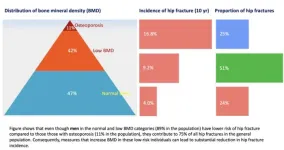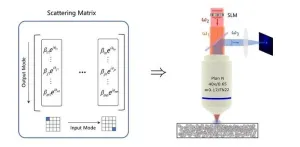(Press-News.org) Disadvantaged teenagers are at greater risk of email scams and need better protection, according to an international study published in the peer-reviewed British Journal of Educational Studies.
Findings based on more than 170,000 students aged 15 show that one in five from low-income families or deprived areas could fall victim to phishing. This is much higher than the probability for the age group overall. Email scams leave people vulnerable to identity theft, putting young people at risk of financial fraud and having their savings stripped.
The most vulnerable are those who also have poor learning skills according to the data from 38 countries including the UK, US and Japan.
Furthermore, the study highlights that students who are taught about the dangers of digital fraud are just as likely to respond inappropriately to these emails as pupils who have received no specific education on the topic.
Author Professor John Jerrim says this highlights a gap in education provision. He is now urging schools to provide more – and better quality – teaching on how to recognize online harms including phishing emails.
“Socio-economically disadvantaged groups are – at least in some countries – at greater risk from phishing attacks than their more advantaged peers,” says Professor Jerrim from University College London in England.
“This is largely driven by socio-economic differences in cognitive abilities. Unfortunately, current attempts by schools to address this issue do not seem to be particularly effective.
“Teenagers taught in the classroom about the risks appear to be just as likely to take inappropriate action. More needs to be done to help young people navigate what is becoming an increasingly complex and dangerous online world.
“This is particularly true for some of the most vulnerable groups who are most at risk of falling for attempts at digital fraud.”
More than 3 billion spam emails are sent every day and phishing is one of the most common attempts at cyber fraud.
Current research into who is most susceptible to this crime tends to focus on older people, not school-age children. Little is known about the efficacy of schools’ attempts to teach young people how to recognize and react appropriately.
Data for this study was based on 176,186 children who took part in the 2018 Programme for International Assessment (PISA), a triennial survey run by the Organisation for Economic Co-operation and Development (OECD).
PISA examines what students in OECD countries know in reading, science, and mathematics. Pupils must complete a two-hour ability test then a questionnaire.
The 2018 PISA asked pupils how they would respond to a made-up scenario where a mobile-phone company told them via email they had won a smartphone. The sender asked them to click a link and fill out their data to claim the phone.
Possible responses included answering the email to request more details, checking the sender’s email address, clicking on the link, and filling out the form as soon as possible.
Professor Jerrim’s study focused on answers to the third response and asked pupils if they had been taught how to detect phishing or spam emails.
Results showed that Japanese teens were least likely to respond (4%) to the email than anywhere else in the world.
The proportion in Denmark, Sweden and Finland who responded was significantly lower (6-7%) than in other developed countries.
Teenagers in Mexico (30%) and Chile (27%) were most at risk – almost a quarter were likely to respond. The figure for the UK was 9%.
No gender difference was found – boys were just as likely to respond as girls. However, teenagers from socio-economically disadvantaged backgrounds were markedly more likely to click the link.
The biggest gap was based on cognitive skill with a quarter of low achieving students saying they believed clicking was the appropriate response. This compared with only 5% of those in the top reading scores.
The study also investigated whether students who receive instruction from their school about the dangers of phishing emails are at less risk of being fooled.
In addition, results showed ‘no clear evidence’ that students who received instruction from their school on phishing email dangers were at less risk.
Limitations of the study included the fact it is based on responses to survey questions. Professor Jerrim said this meant the research did not necessarily capture how teenagers would respond in real life.
END
Deprived teens with poor learning skills at greatest risk from email scams, says expert
2023-09-01
ELSE PRESS RELEASES FROM THIS DATE:
Metal organic framework nanosheets employed as ion carriers for self-optimized zinc anode
2023-09-01
Aqueous rechargeable zinc ion batteries are promising in electric grid storage due to their low cost and intrinsic safety. However, their practical implementation is hindered by poor reversibility of the zinc anode, primarily caused by the chaotic Zn deposition present as dendrite and side reactions.
Recently, a research group led by Prof. YANG Weishen and Dr. ZHU Kaiyue from the Dalian Institute of Chemical Physics (DICP) of the Chinese Academy of Sciences (CAS) has proposed a strategy of "ion ...
How little things can reduce hip fractures
2023-09-01
Simple strategies to strengthen your bones, implemented by the whole community not just those at higher risk, could lead to a substantial decrease in hip fractures, a new Australian study suggests.
A hip fracture, particularly in the elderly, dramatically increases the risk of death. Around 37 per cent of men and 20 per cent of women die within one year of a hip fracture. It also causes significant pain and suffering, loss of mobility and independence, and increased healthcare costs.
Distinguished Professor Tuan Nguyen, ...
Heart transplant patients from socioeconomically distressed communities face higher mortality, organ failure risk
2023-09-01
FINDINGS
People from socioeconomically distressed communities who underwent heart transplantation between 2004 and 2018 faced a 10% greater relative risk of experiencing graft failure and dying within five years compared to people from non-distressed communities. In addition, following implementation of the 2018 UNOS Heart Allocation policy, transplant recipients between 2018 and 2022 faced an approximately 20% increase in relative risk of dying or experiencing graft failure within three years compared with the pre-policy period. This is despite the ...
Striking gold with molecular mystery solution for potential clean energy
2023-09-01
UNIVERSITY PARK, Pa. — Hydrogen spillover is exactly what it sounds like. Small metal nanoparticles anchored on a thermally stable oxide, like silica, comprise a major class of catalysts, which are substances used to accelerate chemical reactions without being consumed themselves. The catalytic reaction usually occurs on the reactive — and expensive — metal, but on some catalysts, hydrogen atom-like equivalents literally spill from the metal to the oxide. These hydrogen-on-oxide species are called "hydrogen ...
Blood biomarker shows “great promise” predicting progression to Alzheimer’s disease in at-risk population
2023-09-01
DETROIT – Neuroscience researchers at Wayne State University published a review article that confirms the usefulness of neurofilament light (NfL) blood levels to predict the likelihood and rate of progression of neurodegeneration in Alzheimer’s disease. Blood-based NfL is a minimally invasive and easily accessible biomarker, making it a useful clinical biomarker. Youjin Jung and Jessica Damoiseaux, Ph.D., analyzed existing literature to examine the association between serum or plasma NfL and ...
Redo transcatheter aortic valve replacement proven effective, safe
2023-09-01
Cedars-Sinai investigators are leaders in the innovation and use of transcatheter aortic valve replacement (TAVR) with balloon-expandable valves. They now show that redo TAVR procedures are both safe and effective when compared with situations in which patients with similar risk profiles undergo the same procedure for the first time.
The novel findings, published today in the peer-reviewed journal The Lancet, are significant because recent randomized clinical trials have shown that TAVR is a meaningful treatment option for both younger and lower-risk surgical ...
Inflammation may influence weight loss surgery outcomes, new study reveals
2023-09-01
Research funded by the National Institute for Health and Care Research (NIHR) has shown that higher levels of inflammation in the blood of patients with obesity undergoing bariatric surgery predicts poorer weight loss six months after the procedure.
Published in Psychological Medicine and led by researchers from the Institute of Psychiatry, Psychology & Neuroscience (IoPPN), King’s College London, this is the first study to investigate the links between depression and inflammation in patients with obesity before and after bariatric surgery. The analysis showed a strong relationship ...
Study shows that low-dose aspirin associated with a 15% lower risk of developing diabetes in people aged over 65 years
2023-09-01
*Note- this is an early release from the Annual Meeting of the European Association for the Study of Diabetes (EASD) meeting in Hamburg, October 2-6. Please credit the meeting if you use this story*
New research to be presented at this year’s Annual Meeting of the European Association for the Study of Diabetes (EASD) in Hamburg, Germany (2-6 October) shows that use of low dose (100mg daily) aspirin among older adults aged 65 years and older is associated with a 15% lower risk of developing type 2 diabetes. The authors, led by Professor Sophia Zoungas, School of Public Health and Preventive Medicine, ...
New grant to optimize gut microbes, boost health benefits of broccoli
2023-08-31
URBANA, Ill. — Love it or hate it, broccoli is chock-full of health-promoting chemicals linked to heart health, cancer prevention, immune function, weight management, and more. However, some people are less efficient than others at unlocking those chemical benefits. A research team at the University of Illinois Urbana-Champaign suggests gut microbe communities may be responsible for the variation. With a new grant from the USDA’s National Institute of Food and Agriculture, the team plans to identify which microbes maximize the benefits of broccoli and other brassica ...
Illuminating new horizons: Navigating nonlinear scattering with precision
2023-08-31
In the intricate world of light, a journey through inhomogeneous media often leads to distortions in space, time, spectrum, and polarization. These distortions, detrimental to applications like optical manipulation, imaging, and communication, have long posed a challenge. Enter the art of wavefront shaping (WS) — a potent tool for correcting these wave maladies in linear optics. But that's not all. Nonlinearity adds a twist, finding purpose in fields from biological sensing to phototherapy. Now, picture combining these forces — ...




